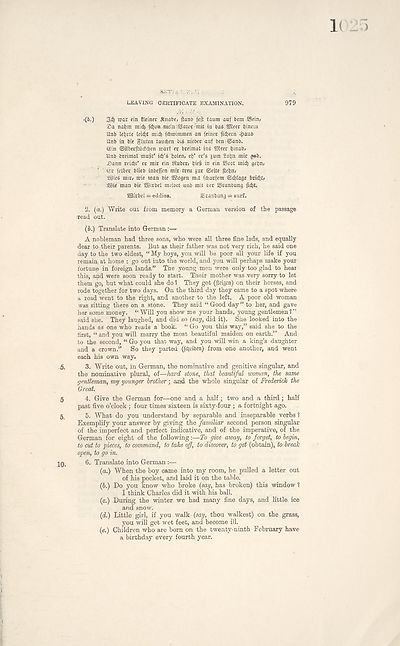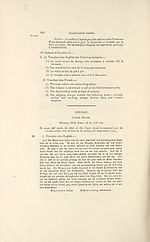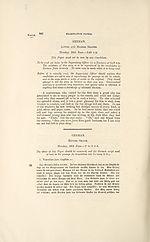Download files
Complete book:
Individual page:
Thumbnail gallery: Grid view | List view

LEAVING 0 ERTIFICATE EXAMINATION.
979
<(&.) 3d) was etn flcincr Jtnabe, ftano feft laum auf bem 23ein,
®a natjm mi(^ fd)OB.,*teln:SlaKC rmit iu baS SKcer binem
Unb le^jrte leidjt mt(^ fcbroimmen an feinec ftdjern
Unb in bie gluten tauten bis nieber auf ben @anb.
(Sin @ilberf:uclct)en rcarf ec breimal ins iKeer binabf
Unb breimal muff id)’S t)olen» ei)’ «’s jum go^n mir g*S.
Sann reicb’.’ er mtr ein Slube^ biff in ein SSoot mis^ gebn,
' (Sr fclber blieb inbejfen mit treu jur ©eite fietjn/
aBieS mir, trie man bie SSBogen mit fcbarfem ©d)lage brid)t/
'Me man bie Mr bet nuibet unb mi: bet SSranbung ftd)t.
SBirbel = eddies. Sranbung = surf.
2. (a.) Write out from memory a German version of the passage
•read out.
(b.) Translate into German :■—
A nobleman had three sons, who were all three fine lads, and equally
dear to their parents. But as their father was not very rich, he said one
day to the two eldest, “ My boys, you will be poor all your life if you
remain at home : go out into the world, and you will perhaps make your
fortune in foreign lands.” The young men were only too glad to hear
this, and were soon ready to start. Their mother was very sorry to let
them gOj but what could she do 1 They got ((leigen) on their horses, and
rode together for two days. On the third day they came to a spot where
a road went to the right, and another to the left.. A poor old woman
was sitting there on a stone. They said “ Good day ” to her, and gave
her some money. “Will you show me your hands, young gentlemen?”
said she. They laughed, and did so (say, did it). She looked into the
hands as one who reads a book. “ Go you this way,” said she to the
first, “ and you will marry the most beautiful maiden on earth.” And
to the second, “ Go you that way, and you will win a king’s daughter
and a crown.” So they parted (fdjciben) from one another, and went
each his own way,
3. Write out, in German, the nominative and genitive singular, and
the nominative plural, of—hard stone, that beautiful woman, the same
gentleman, my younger brother; and the whole singular of Frederick the
Great.
4. Give the German for—one and a half; two and a third; half
past five o’clock ; four times sixteen is sixty-four ; a fortnight ago.
5. What do you understand by separable and inseparable verbs ?
Exemplify your answer by giving the familiar second person singular
of the imperfect and perfect indicative, and of the imperative, of the
German for eight of the following:—To give away, to forget, to begin,
to cut to pieces, to command, to take off, to discover, to get (obtain), to break
open, to go in.
6.. Translate into German:—
(a.) When the boy came into my room, he pulled a letter out
of his pocket, and laid it on the table.
(6.) Do you know who broke (say, has broken) this window ?
I think Charles did it with his ball.
(c.) During the winter we had many fine days, and little ice
and snow.
(d.) Little girl, if you walk (say, thou walkest) on the grass,
you will get wet feet, and become ill.
(e.) Children who are born on the twenty-ninth February have
a birthday every fourth year.
979
<(&.) 3d) was etn flcincr Jtnabe, ftano feft laum auf bem 23ein,
®a natjm mi(^ fd)OB.,*teln:SlaKC rmit iu baS SKcer binem
Unb le^jrte leidjt mt(^ fcbroimmen an feinec ftdjern
Unb in bie gluten tauten bis nieber auf ben @anb.
(Sin @ilberf:uclct)en rcarf ec breimal ins iKeer binabf
Unb breimal muff id)’S t)olen» ei)’ «’s jum go^n mir g*S.
Sann reicb’.’ er mtr ein Slube^ biff in ein SSoot mis^ gebn,
' (Sr fclber blieb inbejfen mit treu jur ©eite fietjn/
aBieS mir, trie man bie SSBogen mit fcbarfem ©d)lage brid)t/
'Me man bie Mr bet nuibet unb mi: bet SSranbung ftd)t.
SBirbel = eddies. Sranbung = surf.
2. (a.) Write out from memory a German version of the passage
•read out.
(b.) Translate into German :■—
A nobleman had three sons, who were all three fine lads, and equally
dear to their parents. But as their father was not very rich, he said one
day to the two eldest, “ My boys, you will be poor all your life if you
remain at home : go out into the world, and you will perhaps make your
fortune in foreign lands.” The young men were only too glad to hear
this, and were soon ready to start. Their mother was very sorry to let
them gOj but what could she do 1 They got ((leigen) on their horses, and
rode together for two days. On the third day they came to a spot where
a road went to the right, and another to the left.. A poor old woman
was sitting there on a stone. They said “ Good day ” to her, and gave
her some money. “Will you show me your hands, young gentlemen?”
said she. They laughed, and did so (say, did it). She looked into the
hands as one who reads a book. “ Go you this way,” said she to the
first, “ and you will marry the most beautiful maiden on earth.” And
to the second, “ Go you that way, and you will win a king’s daughter
and a crown.” So they parted (fdjciben) from one another, and went
each his own way,
3. Write out, in German, the nominative and genitive singular, and
the nominative plural, of—hard stone, that beautiful woman, the same
gentleman, my younger brother; and the whole singular of Frederick the
Great.
4. Give the German for—one and a half; two and a third; half
past five o’clock ; four times sixteen is sixty-four ; a fortnight ago.
5. What do you understand by separable and inseparable verbs ?
Exemplify your answer by giving the familiar second person singular
of the imperfect and perfect indicative, and of the imperative, of the
German for eight of the following:—To give away, to forget, to begin,
to cut to pieces, to command, to take off, to discover, to get (obtain), to break
open, to go in.
6.. Translate into German:—
(a.) When the boy came into my room, he pulled a letter out
of his pocket, and laid it on the table.
(6.) Do you know who broke (say, has broken) this window ?
I think Charles did it with his ball.
(c.) During the winter we had many fine days, and little ice
and snow.
(d.) Little girl, if you walk (say, thou walkest) on the grass,
you will get wet feet, and become ill.
(e.) Children who are born on the twenty-ninth February have
a birthday every fourth year.
Set display mode to:
![]() Universal Viewer |
Universal Viewer | ![]() Mirador |
Large image | Transcription
Mirador |
Large image | Transcription
Images and transcriptions on this page, including medium image downloads, may be used under the Creative Commons Attribution 4.0 International Licence unless otherwise stated. ![]()
| Scottish school exams and circulars > Leaving Certificate Examination > (29) |
|---|
| Permanent URL | https://digital.nls.uk/144136360 |
|---|
| Shelfmark | P.P. 1906 XXX |
|---|---|
| Attribution and copyright: |
|
| Description | Examination papers for the School Leaving Certificate 1888-1961 and the Scottish Certificate of Education 1962-1963. Produced by the Scotch (later 'Scottish') Education Department, these exam papers show how education developed in Scotland over this period, with a growing choice of subjects. Comparing them with current exam papers, there are obvious differences in the content and standards of the questions, and also in the layout and use of language |
|---|---|
| Additional NLS resources: |
|



